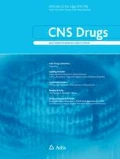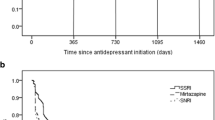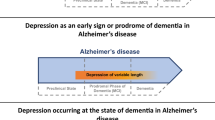Abstract
The relationship between antidepressants and Alzheimer’s disease (AD) is very complex, and the literature is mixed regarding the effect of these medications on the trajectory of the disease. This paper reviews findings from relevant clinical studies that have assessed the impact of antidepressants on AD onset and disease progression. To date, these medications seem to attenuate the risk of developing the disease without affecting the rate of progression. However, most evidence stems from observational studies that are subject to methodological bias. Serotonergic antidepressants are thought to affect AD pathophysiology by reducing β-amyloid (Aβ) plaque formation and promoting hippocampal neurogenesis. However, the mechanisms underlying their effect need to be examined further, especially in humans. Moreover, more robust clinical studies in terms of design (randomized controlled trials) and longer duration of follow-up are needed. Variables, including depression timeline/onset and its clinical course, apolipoprotein E4 (APOE4) genotype status, sex, dose/duration of antidepressant treatment, and AD biomarkers need to be incorporated in future trials to better elucidate the effect of antidepressants on AD risk.
Similar content being viewed by others
References
Prince M, Comas-Herrera A, Knapp M, Guerchet M, Karagiannidou M. World Alzheimer Report 2016: improving healthcare for people living with dementia coverage, quality and costs now and in the future; 2016. Accessed 1 July 2018.
Zissimopoulos J, Crimmins E, St. Clair P. The value of delaying Alzheimer’s disease onset. Forum Health Econ Policy. 2014;18(1):25–39. https://doi.org/10.1515/fhep-2014-0013.
Dubois B, Hampel H, Feldman HH, Scheltens P, Aisen P, Andrieu S, et al. Preclinical Alzheimer’s disease: definition, natural history, and diagnostic criteria. Alzheimer’s Dementia. 2016;12(3):292–323. https://doi.org/10.1016/j.jalz.2016.02.002.
Jack CR, Bennett DA, Blennow K, Carrillo MC, Dunn B, Haeberlein SB, et al. NIA-AA research framework: toward a biological definition of Alzheimer’s disease. Alzheimer’s Dementia. 2018;14(4):535–62. https://doi.org/10.1016/j.jalz.2018.02.018.
Livingston G, Sommerlad A, Orgeta V, Costafreda SG, Huntley J, Ames D, et al. Dementia prevention, intervention, and care. Lancet. 2017;390(10113):2673–734. https://doi.org/10.1016/S0140-6736(17)31363-6.
Steenland K, Karnes C, Seals R, Carnevale C, Hermida A, Levey A. Late-life depression as a risk factor for mild cognitive impairment or Alzheimer’s disease in 30 US Alzheimer’s disease centers. J Alzheimer’s Dis. 2012;31(2):265–75. https://doi.org/10.3233/jad-2012-111922.
Ismail Z, Elbayoumi H, Fischer CE, et al. Prevalence of depression in patients with mild cognitive impairment: a systematic review and meta-analysis. JAMA Psychiatry. 2017;74(1):58–67. https://doi.org/10.1001/jamapsychiatry.2016.3162.
Chi S, Wang C, Jiang T, Zhu XC, Yu JT, Tan L. The prevalence of depression in Alzheimer’s disease: a systematic review and meta-analysis. Curr Alzheimer Res. 2015;12(2):189–98.
Brommelhoff JA, Gatz M, Johansson B, McArdle JJ, Fratiglioni L, Pedersen NL. Depression as a risk factor or prodomal feature for dementia? Findings in a population-based sample of Swedish twins. Psychol Aging. 2009;24(2):373–84. https://doi.org/10.1037/a0015713.
Li G, Wang LY, Shofer JB, et al. Temporal relationship between depression and dementia: findings from a large community-based 15-year follow-up study. Arch Gen Psychiatry. 2011;68(9):970–7. https://doi.org/10.1001/archgenpsychiatry.2011.86.
Ismail Z, Gatchel J, Bateman DR, Barcelos-Ferreira R, Chantillon M, Jaeger J, et al. Affective and emotional dysregulation as pre-dementia risk markers: exploring the mild behavioral impairment symptoms of depression, anxiety, irritability, and euphoria. Int Psychogeriatr. 2018;30(2):185–96. https://doi.org/10.1017/s1041610217001880.
Mirza SS, Wolters FJ, Swanson SA, Koudstaal PJ, Hofman A, Tiemeier H, et al. 10-year trajectories of depressive symptoms and risk of dementia: a population-based study. Lancet Psychiatry. 2016;3(7):628–35. https://doi.org/10.1016/S2215-0366(16)00097-3.
Caraci F, Copani A, Nicoletti F, Drago F. Depression and Alzheimer’s disease: neurobiological links and common pharmacological targets. Eur J Pharmacol. 2010;626(1):64–71. https://doi.org/10.1016/j.ejphar.2009.10.022.
Cirrito JR, Disabato BM, Restivo JL, Verges DK, Goebel WD, Sathyan A, et al. Serotonin signaling is associated with lower amyloid-beta levels and plaques in transgenic mice and humans. Proc Natl Acad Sci USA. 2011;108(36):14968–73.
Sheline YI, West T, Yarasheski K, Swarm R, Jasielec MS, Fisher JR, et al. An antidepressant decreases CSF Abeta production in healthy individuals and in transgenic AD mice. Sci Transl Med. 2014;6(236):236re4. https://doi.org/10.1126/scitranslmed.3008169.
Malberg JE, Eisch AJ, Nestler EJ, Duman RS. Chronic antidepressant treatment increases neurogenesis in adult rat hippocampus. J Neurosci. 2000;20(24):9104–10.
Moraros J, Nwankwo C, Patten SB, Mousseau DD. The association of antidepressant drug usage with cognitive impairment or dementia, including Alzheimer disease: a systematic review and meta-analysis. Depress Anxiety. 2017;34(3):217–26. https://doi.org/10.1002/da.22584.
Then CK, Chi NF, Chung KH, Kuo L, Liu KH, Hu CJ, et al. Risk analysis of use of different classes of antidepressants on subsequent dementia: a nationwide cohort study in Taiwan. PLoS One. 2017;12(4):e0175187. https://doi.org/10.1371/journal.pone.0175187.
Csukly G, Sirály E, Fodor Z, Horváth A, Salacz P, Hidasi Z, et al. The differentiation of amnestic type MCI from the non-amnestic types by structural MRI. Front Aging Neurosci. 2016;8:52. https://doi.org/10.3389/fnagi.2016.00052.
Mitchell AJ, Shiri-Feshki M. Rate of progression of mild cognitive impairment to dementia—meta-analysis of 41 robust inception cohort studies. Acta Psychiatr Scand. 2009;119(4):252–65. https://doi.org/10.1111/j.1600-0447.2008.01326.x.
Tifratene K, Robert P, Metelkina A, Pradier C, Dartigues JF. Progression of mild cognitive impairment to dementia due to AD in clinical settings. Neurology. 2015;85(4):331–8. https://doi.org/10.1212/wnl.0000000000001788.
Tsiouris JA, Patti PJ, Flory MJ. Effects of antidepressants on longevity and dementia onset among adults with Down syndrome: a retrospective study. J Clin Psychiatry. 2014;75(7):731–7. https://doi.org/10.4088/JCP.13m08562.
Wiseman FK, Al-Janabi T, Hardy J, Karmiloff-Smith A, Nizetic D, Tybulewicz VL, et al. A genetic cause of Alzheimer disease: mechanistic insights from Down syndrome. Nat Rev Neurosci. 2015;16(9):564–74. https://doi.org/10.1038/nrn3983.
Bartels C, Wagner M, Wolfsgruber S, Ehrenreich H, Schneider A. Impact of SSRI therapy on risk of conversion from mild cognitive impairment to Alzheimer’s dementia in individuals with previous depression. Am J Psychiatry. 2018;175(3):232–41. https://doi.org/10.1176/appi.ajp.2017.17040404.
Burke SL, Maramaldi P, Cadet T, Kukull W. Decreasing hazards of Alzheimer’s disease with the use of antidepressants: mitigating the risk of depression and apolipoprotein E. Int J Geriatr Psychiatry. 2018;33(1):200–11. https://doi.org/10.1002/gps.4709.
Kessing LV, Søndergård L, Forman JL, Andersen PK. Antidepressants and dementia. J Affect Disord. 2009;117(1):24–9. https://doi.org/10.1016/j.jad.2008.11.020.
Caballero J, Hitchcock M, Beversdorf D, Scharre D, Nahata M. Long-term effects of antidepressants on cognition in patients with Alzheimer’s disease. J Clin Pharm Ther. 2006;31(6):593–8.
Dutcher SK, Rattinger GB, Langenberg P, Chhabra PT, Liu X, Rosenberg PB, et al. Effect of medications on physical function and cognition in nursing home residents with dementia. J Am Geriatr Soc. 2014;62(6):1046–55. https://doi.org/10.1111/jgs.12838.
Mossello E, Boncinelli M, Caleri V, Cavallini MC, Palermo E, Di Bari M, et al. Is antidepressant treatment associated with reduced cognitive decline in Alzheimer’s disease? Dementia Geriatr Cogn Disord. 2008;25(4):372–9. https://doi.org/10.1159/000121334.
Rozzini L, Chilovi BV, Conti M, Bertoletti E, Zanetti M, Trabucchi M, et al. Efficacy of SSRIs on cognition of Alzheimer’s disease patients treated with cholinesterase inhibitors. Int Psychogeriatr. 2010;22(1):114–9. https://doi.org/10.1017/s1041610209990184.
Rosenberg PB, Mielke MM, Han D, Leoutsakos JS, Lyketsos CG, Rabins PV, et al. The association of psychotropic medication use with the cognitive, functional, and neuropsychiatric trajectory of Alzheimer’s disease. Int J Geriatr Psychiatry. 2012;27(12):1248–57.
Reifler BV, Teri L, Raskind M, Veith R, Barnes R, White E, et al. Double-blind trial of imipramine in Alzheimer’s disease patients with and without depression. Am J Psychiatry. 1989;146(1):45–9. https://doi.org/10.1176/ajp.146.1.45.
Choe YM, Kim KW, Jhoo JH, Ryu SH, Seo EH, Sohn BK, et al. Multicenter, randomized, placebo-controlled, double-blind clinical trial of escitalopram on the progression-delaying effects in Alzheimer’s disease. Int J Geriatr Psychiatry. 2016;31(7):731–9. https://doi.org/10.1002/gps.4384.
Finkel SI, Mintzer JE, Dysken M, Krishnan KR, Burt T, McRae T. A randomized, placebo-controlled study of the efficacy and safety of sertraline in the treatment of the behavioral manifestations of Alzheimer’s disease in outpatients treated with donepezil. Int J Geriatr Psychiatry. 2004;19(1):9–18. https://doi.org/10.1002/gps.998.
Mowla A, Mosavinasab M, Haghshenas H, Borhani Haghighi A. Does serotonin augmentation have any effect on cognition and activities of daily living in Alzheimer’s dementia? A double-blind, placebo-controlled clinical trial. J Clin Psychopharmacol. 2007;27(5):484–7. https://doi.org/10.1097/jcp.0b013e31814b98c1.
Porsteinsson AP, Drye LT, Pollock BG, Devanand DP, Frangakis C, Ismail Z, et al. Effect of citalopram on agitation in Alzheimer disease: the CitAD randomized clinical trial. JAMA. 2014;311(7):682–91. https://doi.org/10.1001/jama.2014.93.
Petracca GM, Chemerinski E, Starkstein SE. A double-blind, placebo-controlled study of fluoxetine in depressed patients with Alzheimer’s disease. Int Psychogeriatr. 2001;13(2):233–40.
Lyketsos CG, DelCampo L, Steinberg M, Miles Q, Steele CD, Munro C, et al. Treating depression in Alzheimer disease: efficacy and safety of sertraline therapy, and the benefits of depression reduction: the DIADS. Arch Gen Psychiatry. 2003;60(7):737–46. https://doi.org/10.1001/archpsyc.60.7.737.
Munro CA, Brandt J, Sheppard J-ME, Steele CD, Samus QM, Steinberg M, et al. Cognitive response to pharmacological treatment for depression in alzheimer disease: secondary outcomes from the Depression in Alzheimer’s Disease Study (DIADS). Am J Geriatr Psychiatry. 2004;12(5):491–8. https://doi.org/10.1097/00019442-200409000-00007.
Olin JT, Schneider LS, Katz IR, Meyers BS, Alexopoulos GS, Breitner JC, et al. Provisional diagnostic criteria for depression of Alzheimer disease. Am J Geriatr Psychiatry. 2002;10(2):125–8. https://doi.org/10.1097/00019442-200203000-00003.
Munro CA, Longmire CF, Drye LT, Martin BK, Frangakis CE, Meinert CL, et al. Cognitive outcomes after sertaline treatment in patients with depression of Alzheimer disease. Am J Geriatr Psychiatry. 2012;20(12):1036–44. https://doi.org/10.1097/JGP.0b013e31826ce4c5.
Banerjee S, Hellier J, Dewey M, Romeo R, Ballard C, Baldwin R, et al. Sertraline or mirtazapine for depression in dementia (HTA-SADD): a randomised, multicentre, double-blind, placebo-controlled trial. Lancet (London, England). 2011;378(9789):403–11. https://doi.org/10.1016/s0140-6736(11)60830-1.
Mokhber N, Abdollahian E, Soltanifar A, Samadi R, Saghebi A, Haghighi MB, et al. Comparison of sertraline, venlafaxine and desipramine effects on depression, cognition and the daily living activities in Alzheimer patients. Pharmacopsychiatry. 2014;47(4–5):131–40. https://doi.org/10.1055/s-0034-1377041.
Cherbuin N, Reglade-Meslin C, Kumar R, Jacomb P, Easteal S, Christensen H, et al. Risk factors of transition from normal cognition to mild cognitive disorder: the PATH through Life Study. Dementia Geriatr Cogn Disord. 2009;28(1):47–55. https://doi.org/10.1159/000229025.
Goveas JS, Hogan PE, Kotchen JM, Smoller JW, Denburg NL, Manson JE, et al. Depressive symptoms, antidepressant use, and future cognitive health in postmenopausal women: the Women’s Health Initiative Memory Study. Int Psychogeriatr. 2012;24(8):1252–64.
Sachdev PS, Lipnicki DM, Crawford J, Reppermund S, Kochan NA, Trollor JN, et al. Risk profiles of subtypes of mild cognitive impairment: the Sydney memory and ageing study. J Am Geriatr Soc. 2012;60(1):24–33. https://doi.org/10.1111/j.1532-5415.2011.03774.x.
Angst J, Gamma A, Gerber-Werder R, Zarate CA Jr, Manji HK. Does long-term medication with lithium, clozapine or antidepressants prevent or attenuate dementia in bipolar and depressed patients? Int J Psychiatry Clin Pract. 2007;11(1):2–8. https://doi.org/10.1080/13651500600810133.
Patten SB. Confounding by severity and indication in observational studies of antidepressant effectiveness. Can J Clin Pharmacol. 2008;15(2):e367–71.
Salas M, Hofman A, Stricker BH. Confounding by indication: an example of variation in the use of epidemiologic terminology. Am J Epidemiol. 1999;149(11):981–3.
Mowla A, Mosavinasab M, Pani A. Does fluoxetine have any effect on the cognition of patients with mild cognitive impairment? A double-blind, placebo-controlled, clinical trial. J Clin Psychopharmacol. 2007;27(1):67–70. https://doi.org/10.1097/JCP.0b013e31802e0002.
Ismail Z, Agüera-Ortiz L, Brodaty H, Cieslak A, Cummings J, Fischer CE, et al. The Mild Behavioral Impairment Checklist (MBI-C): a rating scale for neuropsychiatric symptoms in pre-dementia populations. J Alzheimer’s Dis. 2017;56(3):929–38. https://doi.org/10.3233/JAD-160979.
Fisher JR, Wallace CE, Tripoli DL, Sheline YI, Cirrito JR. Redundant G(s)-coupled serotonin receptors regulate amyloid-β metabolism in vivo. Mol Neurodegener. 2016;11:45. https://doi.org/10.1186/s13024-016-0112-5.
Sanchez C, Asin KE, Artigas F. Vortioxetine, a novel antidepressant with multimodal activity: review of preclinical and clinical data. Pharmacol Ther. 2015;145:43–57. https://doi.org/10.1016/j.pharmthera.2014.07.001.
Quinn R. Comparing rat’s to human’s age: how old is my rat in people years? Nutrition (Burbank, Los Angeles County, Calif). 2005;21(6):775–7. https://doi.org/10.1016/j.nut.2005.04.002.
Li YS, Meyer JS, Thornby J. Longitudinal follow-up of depressive symptoms among normal versus cognitively impaired elderly. Int J Geriatr Psychiatry. 2001;16(7):718–27.
Author information
Authors and Affiliations
Corresponding author
Ethics declarations
Funding
No sources of funding were used to conduct this study or prepare this manuscript.
Conflict of interest
RK has no conflicts of interest. GTG is a consultant for Acadia, Alkahest, Allergan, Avanir, Axovant, BioXcel, GE, Genentech, Lundbeck, Novartis, Otsuka, Roche, and Takeda; has received research support from Janssen, Roche, and the National Institutes of Health (NIH); and has served on a speaker’s bureau for Acadia and on safety monitoring committees for EryDel, Merck, and Newron.
Rights and permissions
About this article
Cite this article
Khoury, R., Grossberg, G.T. Impact of Antidepressant Use on the Trajectory of Alzheimer’s Disease: Evidence, Mechanisms, and Therapeutic Implications. CNS Drugs 33, 17–29 (2019). https://doi.org/10.1007/s40263-018-0590-9
Published:
Issue Date:
DOI: https://doi.org/10.1007/s40263-018-0590-9




